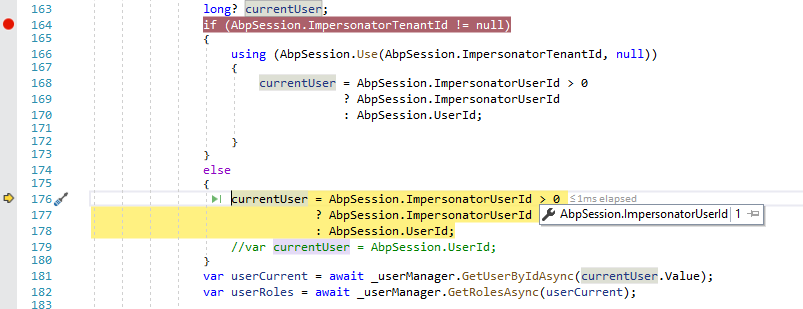ERROR 2019-11-21 16:11:48,693 [35 ] Mvc.ExceptionHandling.AbpExceptionFilter - There is no user with id: 1
Abp.AbpException: There is no user with id: 1
at Abp.Authorization.Users.AbpUserManager`2.GetUserByIdAsync(Int64 userId) in D:\Github\aspnetboilerplate\src\Abp.ZeroCore\Authorization\Users\AbpUserManager.cs:line 340
// (more proprietary stack data omitted)
...occurs when attempting to get the impersonator User Id (Id = 1).
var susr = AbpSession.ImpersonatorUserId > 0
? AbpSession.ImpersonatorUserId
: AbpSession.UserId;
var rler = await _userManager.GetUserByIdAsync(susr.Value);
var rlerRoles = await _userManager.GetRolesAsync(rler);
The user with Id = 1 is created in HostRoleAndUserCreator.cs, and exists in the dbo.AbpUsers table.
private void CreateHostRoleAndUsers()
{
// (omitted code)
//admin user for host
var adminUserForHost = _context.Users.IgnoreQueryFilters().FirstOrDefault(u => u.TenantId == null && u.UserName == AbpUserBase.AdminUserName);
if (adminUserForHost == null)
{
var user = new User
{
TenantId = null,
UserName = AbpUserBase.AdminUserName,
Name = "admin",
Surname = "admin",
EmailAddress = "[email protected]",
IsEmailConfirmed = true,
ShouldChangePasswordOnNextLogin = false,
IsActive = true,
Password = "AM4OLBpptxBYmM79lGOX9egzZk3vIQU3d/gFCJzaBjAPXzYIK3tQ2N7X4fcrHtElTw==" //123qwe
};
user.SetNormalizedNames();
adminUserForHost = _context.Users.Add(user).Entity;
_context.SaveChanges();
// (omitted code)
}
When impersonating a User after logging in as tenant admin the code does not throw an exception. When impersonating a User after logging in as host atmin the code throws an exception.
5 Answer(s)
-
0
When impersonating a User after logging in as host admin, the Exception identified at the start of this post ("There is no user with id: 1") is thrown when
_userManager.GetUserByIdAsync(currentUser.Value);is called.Specific steps:
- login as host admin
- navigate to 'Tenants'
- Under 'Actions', select 'Login as this tenant'
- Select a non-admin tenant to impersonate. The impersonated User's id is 4, however
currentUser.Value = 1, which is the host admin Id.
-
0
Hi @timmackey
Does this happen during development tiem or production ? If it is production, do you use sbudomain name as tenancy name ?
Thanks,
-
0
This happens during development. The only way to obtain the screenshot above is with a Debug build. The tenancy name is NOT being used as a subdomain, although I would like to be able to do that in the future.
-
0
hi timmackey
You can try the SetTenantId method to switch the tenant of the current unit of work.
Because the host user cannot be queried under the tenant
using (_unitOfWorkManager.Current.SetTenantId(tenantId)) { var susr = AbpSession.ImpersonatorUserId > 0 ? AbpSession.ImpersonatorUserId : AbpSession.UserId; var rler = await _userManager.GetUserByIdAsync(susr.Value); var rlerRoles = await _userManager.GetRolesAsync(rler); } -
0
The solution I settled on was to test
if (AbpSession.ImpersonatorUserId == 1), then don't call_userManager.GetUserByIdAsync, since by definition if the UserId is 1, then I know who the user is - the host admin.




